FOR IMMEDIATE RELEASE
SiSoftware Sandra 2013 Released:
Updated Device Performance Certification, New Drivers/Firmware Notification, Windows 8 support
NB: This version has been replaced by Sandra 2014.
Updates: SP6 (October 2nd 2013), SP4 (June 15th 2013), SP3 (March 26th 2013), SP2, SP1 (December 7th 2012).
London, UK, November 5th 2012 – We are pleased to announce the launch of SiSoftware Sandra 2013, the latest version of our award-winning utility, which includes remote analysis, benchmarking and diagnostic features for PCs, servers, mobile devices and networks.
While Sandra has been updated for the brand-new Windows 8 / Server 2012 operating systems, we have not forgotten Windows 7, Vista or XP users – all new features and enhancements are supported on all operating systems.
As SiSoftware operates a “just-in-time” release cycle, some features were introduced in Sandra 2012 service packs: in Sandra 2013 they have been updated and enhanced based on all the feedback received.
Here is an in-depth new feature list of Sandra 2013:
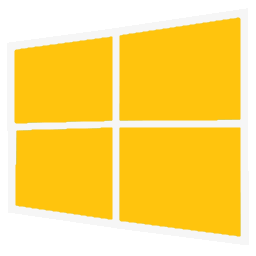 |
Broad Operating System Support
|
- Enhanced for Windows 8 / Server 2012 Desktop mode using the latest API.
- New theme for Windows 8 / Server 2012 and its brand new look (ex-Metro).
- Full support for Windows 7, Vista and XP as well as Server 2008/R2 and Server 2003/R2.
- Updated hardware support for both current and future hardware (AMD “Trinity”, “Vishera”; Intel “Haswell”)
 |
New driver/firmware notification
|
Sandra checks for updated firmware/BIOS or device drivers for all components/peripherals and provides the user with download information [commercial versions only]:
- System BIOS update
- Video Card BIOS update, driver update (including DirectX, OpenGL, OpenCL and CUDA)
- Disk (Hard Disk, Optical Drive or SSD) firmware update
- CPU microcode update
- USB device firmware update, driver update
- Printer firmware update, driver update
- Network device (e.g. router, wireless access point) firmware update
 |
Updated Device Performance Certification*
|
Device Performance Certification validates whether the benchmark result (score) you have obtained upon benchmarking your device is valid (i.e. the device you tested is performing correctly) and how it compares to the scores obtained by other users when testing the same device.
By aggregating the results submitted for each device and performing statistical analysis (e.g. computing mean/average, standard deviation, etc.) we can use statistical tools to work out whether the score is within the expected range (confidence intervals).
Based on the variability of scores you can determine whether the performance of your device is consistent or varies significantly from test to test.
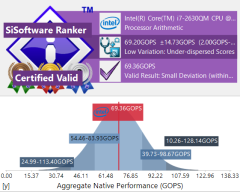 |
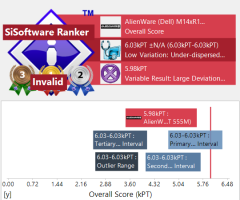 |
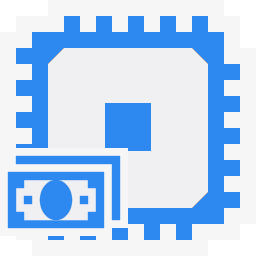 |
New GP / HC (GPU/APU/CPU) Financial Analysis benchmark
|
Tests the performance of the three (3) standard financial models (options pricing); different models are used in organised option trading to determine their future worth (e.g. price at expiration date / “strike” price) and thus their worth:
- Binomial Option Pricing (European Model)
- Black-Scholes Option Pricing (European Model)
- Monte Carlo Option Pricing (European Model)
Two floating-point precisions:
- Normal precision – FP32 (32-bit floating point)
- High precision – FP64 (64-bit floating point)
Available in both OpenCL and CUDA. (DirectX ComputeShader support coming soon)
We have published an article on the financial analysis performance of current (GP)GPU architectures: GP Financial Analysis.
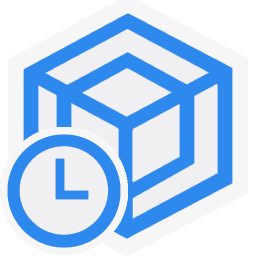 |
New GP / HC (GPU/APU/CPU) Cache/Memory Latency benchmark
|
Benchmark all the different memories (global, constant, shared/local, private) of modern (GP)GPUs using the 3 access patterns (in-page random, full random, sequential/linear) in OpenCL, CUDA and DirectX ComputeShader. See the differences between modern (GP)GPU architectures from AMD and nVidia or APU architectures from AMD and Intel.
We have published an article on the cache/memory latencies of current (GP)GPU architectures: GP GPU/APU Cache and Memory Latencies.
 |
New GP / HC (GPU/APU/CPU) Cache Bandwidth benchmark
|
Benchmark all the different memories (global, constant, shared/local, private) of modern (GP)GPUs and measure L1, L2 and L3 cache bandwidths in OpenCL and CUDA. See the differences between modern (GP)GPU architectures from AMD and nVidia or APU architectures from AMD and Intel.
We have published an article on the cache bandwidths of current (GP)GPU architectures: GP GPU/APU Cache and Memory Bandwidths.
 |
New Memory Transaction Throughput benchmark |
Measures the transaction throughput of the memory sub-system using different locks and update algorithms. It shows the improvement the new transactional synchronisation extensions (TSX: HLE and RTM of Intel Haswell and future AMD CPUs) bring to locking mechanisms that are used in modern multithreaded operating systems and applications.
We have published an article on TSX of different CPU architectures: TSX and Memory Transaction Throughputs.
 |
Updated Overall Score benchmark for complete system performance evaluation
|
While each benchmark measures the performance of a specific device (CPU, Memory, (GP)GPU, Storage, etc.), there is a real need for a benchmark to evaluate the overall computer performance: this new benchmark is a weighted average of the individual scores of the existing benchmarks:
- Native CPU Arithmetic, Cryptographic [new] and Multi-Media (SIMD): measures native processor performance
- .Net/Java Arithmetic, Cryptographic [new] and Multi-Media (vectorised): measures software virtual machine performance (e.g. for .Net WPF/Silverlight/METRO applications)
- Memory and Cache Bandwidth and Latency [new]: measures memory and caches performance
- File System/Storage Bandwidth and I/O [new]: measures storage performance
- GP (General Processing) / HC (Heterogonous Compute) (GPU/APU) Arithmetic, Cryptographic and Bandwidth: measures (GP)GPU/APU performance
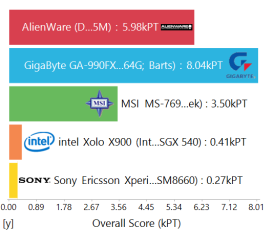 |
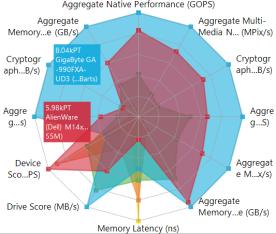 |
 |
Memory Latency benchmark: code/instruction cache latencies
|
Modern processors have dedicated cache sub-systems (e.g. L1I, L2I) to handle code/instructions that, while just as important as data caches, are not assessed by most benchmarks.
Sandra 2013 adds a brand new benchmark using its 3 dedicated access patterns (“in-page” thus avoiding “out-of-page” latencies, “full random” and “linear/sequential”) to fully test code caches performance.
We have published an article on the cache latencies of current CPU architectures: Measuring Cache and Memory Latency (access patters, paging and TLBs).
 |
Brand new style for Windows 8 |
Windows 8 has its own style (ex-Metro) that it shares with Windows Phone 7/8. Love it or hate it, it is here to stay. We have also provided Windows 7, Vista and XP users with an updated, modern style:
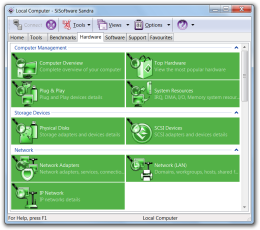 |
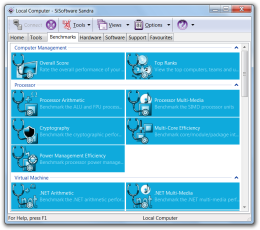 |
 |
Price Engine: invaluable |
Why? The Price engine enhances the user’s experience by providing product pictures and additional specifications – as well as the the latest price. It enables the calculation of important metrics like Performance vs. Price and Capacity vs. Price (for storage media) which are extremely useful when making comparisons. All this is done automatically rather than manually searching for pricing, a great time saver.
Key features of Sandra 2013
- 3 native architectures support (x86, x64, ARM).
- Huge official hardware support through technology partners (Intel, AMD/ATI, SiS, VIA).
- 5 native virtualisation technologies support (Virtual PC 7, Virtual Server 2005, Hyper-V Server, VMware Server/ESX, VMware WorkStation/Player)
- 3 native (GP)GPU/APU platforms support (OpenCL, DirectX Compute Shader, CUDA).
- 4 native Graphics platforms support (DirectX 11.x, DirectX 10.x, DirectX 9, OpenGL 2.0+).
- 9 language versions (English, German, French, Italian, Spanish, Japanese, Chinese (Traditional, Simplified), Russian) in a single installer.
- Enhanced Sandra Lite (Eval) version (free for personal/educational use, evaluation for other uses)
Relevant Articles
For more details, please see the following articles:
- TSX and Memory Transaction Throughputs
- Multi-Buffer Hashing Performance (SHA) through AVX2, AVX and SSE
- GP GPU/APU Cache and Memory Latencies
- GP GPU/APU Cache and Memory Bandwidths
- SiSoftware Official Live Ranker
Purchasing
For more details, and to purchase the commercial versions, please click here.
Updating or Upgrading
To update your existing commercial version, please click here.
Downloading
For more details, and to download the Lite (Evaluation) version, please click here.
Reviewers and Editors
For your free review copies, please contact us.
About SiSoftware
SiSoftware, founded in 1995, is one of the leading providers of computer analysis, diagnostic and benchmarking software. The flagship product, known as “SANDRA”, was launched in 1997 and has become one of the most widely used products in its field. Nearly 700 worldwide IT publications, magazines and review sites use SANDRA to analyse the performance of today’s computers. Over 9,000 on-line reviews of computer hardware that use SANDRA are catalogued on our website alone.
Since launch, SiSoftware has always been at the forefront of the technology arena, being among the first providers of benchmarks that show the power of emerging new technologies such as multi-core, GPGPU, OpenCL, DirectCompute, x64, ARM, MIPS, NUMA, SMT (Hyper-Threading), SMP (multi-threading), AVX3, AVX2, AVX, FMA4, FMA, NEON, SSE4.2, SSE4.1, SSSE3, SSE3, SSE2, SSE, Java and .NET.
SiSoftware is located in London, UK. For more information, please visit http://www.sisoftware.net, http://www.sisoftware.eu, http://www.sisoftware.info or http://www.sisoftware.co.uk
